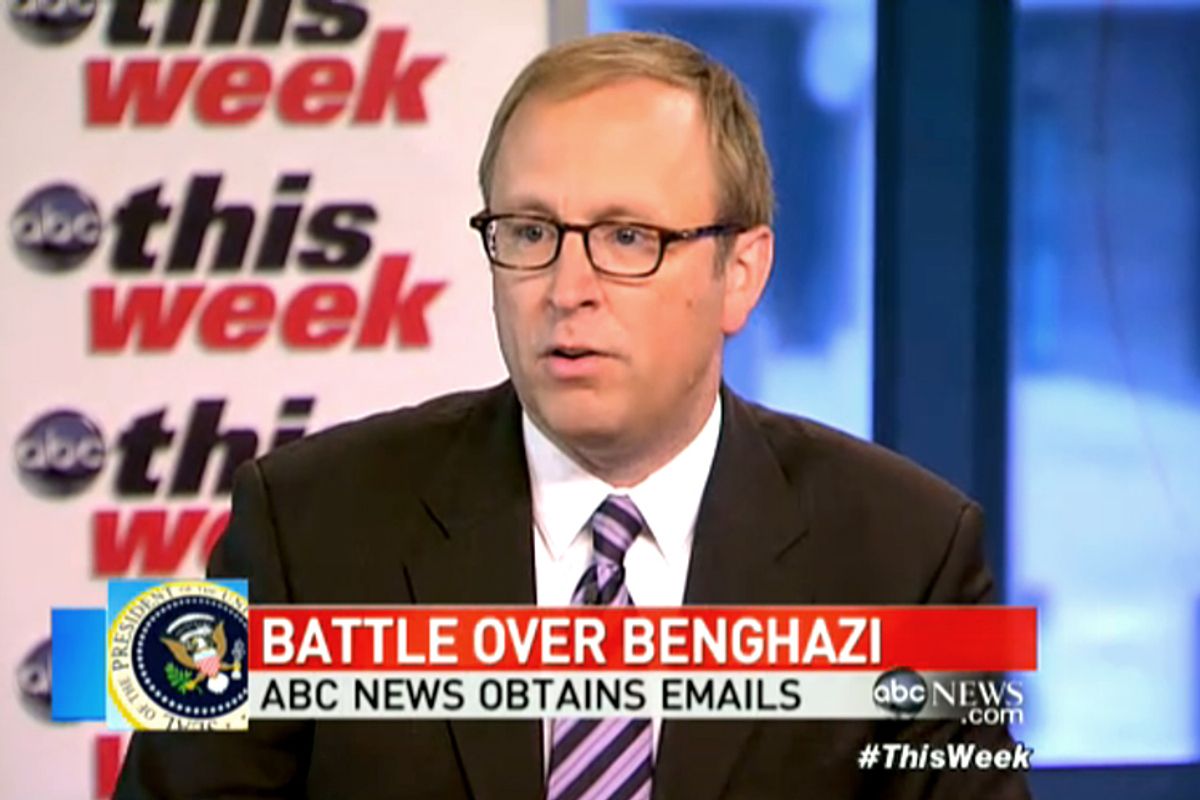The Obama administration started Tuesday mired in three scandals the GOP seemed able to tie “into one ‘Big Brother Obama’ storyline,” in the words of Greg Sargent, and ended it appearing to face political culpability on only one, the Department of Justice’s broad subpoenas obtaining phone records from the Associated Press. It’s not to say Benghazi or the IRS mess went away, but the GOP’s creepy plotline got a whole lot less plausible.
The Benghazi “scandal” lost velocity thanks to CNN’s Jake Tapper reporting that an email key to the notion that the White House doctored talking points to protect the State Department didn’t at all read the way ABC’s Jonathan Karl reported it. Karl quoted White House national security communications adviser Ben Rhodes’ email specifically saying the talking points should “reflect all agency equities, including those of the State Department,” but the actual email obtained by Tapper didn’t mention the State Department at all. Karl ended the day with the shocking admission that while he’d reported on air that he’d “obtained” the emails in question, and wrote online that he’d “reviewed” them, in fact he’d only heard about them from the notes of a source – presumed to be a House GOP staffer.
Amazingly, Karl insisted Tapper’s reporting didn’t challenge the basic facts of his story, even though he acknowledged for the first time that he hadn’t actually “obtained” or “reviewed” the actual emails, but rather had notes about them read to him by his source. The fact that Karl put the purported email from Rhodes within quotation marks – which in actual journalism means you’re reading a direct quote from someone – seriously damages his credibility. But the ABC reporter concluded his self-defense by blaming the White House for failing to release all the emails – rather than blaming his source for misleading him, or himself for misleading his readers by using quotes around the Rhodes email.
Here’s hoping ABC News explains why the paraphrased depiction of notes about an email from a hostile source wound up within quotation marks attributed to Rhodes, and whether that’s the news organization’s policy.
On the IRS mess, the day closed with the release of the inspector general’s report on the improper review of applications by Tea Party-related groups for tax-exempt “social welfare” status. The report blamed “inadequate management” for the review process, which began under Bush-appointed leadership, and it reads like everyone’s worst nightmare of incompetent government. But it finds no evidence that anyone higher than middle management was responsible for the review. Moreover, although it's clear that groups with Tea Party or Patriot in their names came in for more scrutiny and delay than most liberal groups, more than two-thirds of the groups flagged for review had nothing to do with the Tea Party. And none of the conservatives were denied tax-exempt status, though many faced long delays. Ironically, the only group that saw its status denied (for 10 of its chapters) was Emerge America, which works to elect Democratic women to office.
Within hours, President Obama sent a scathing statement about the IG’s findings, calling them “intolerable and inexcusable” and promising that Treasury Secretary Jack Lew would make sure all of its recommendations to correct the flaws in the IRS’s review process were implemented.
It’s the DOJ’s subpoena of phone records for 20 AP phone lines used by at least 100 reporters, in pursuit of a government official who leaked information about the U.S. foiling another al-Qaida underwear-bomb plot, that has the capacity to damage the Obama administration. This White House is already shadowed by the fact that it has prosecuted more government “leakers” – also known as whistle-blowers – than all previous administrations put together.
As Marcy Wheeler explained in Salon, the DOJ’s own guidelines require it to go directly to the news agency in question with its subpoena, which would have given AP the right to negotiate over it, or challenge it in court. The DOJ may subvert that requirement if going to the news agency would “pose a substantial threat to the integrity of the investigation.” Since the investigation into the identity of the leaker was already big news – in fact, congressional leaders in both parties had demanded it – it hardly constituted a secret operation that would be blown by negotiating with the AP.
So did Tuesday’s developments on the Benghazi and IRS fronts break scandal fever in the Beltway? Sadly, no. On Wednesday MSNBC’s “Morning Joe” remained scandal central, setting the day’s agenda. The Washington Post’s Dana Milbank’s wispy, fact-light “President Passerby” seems to be the top talking point: Even if some of the smoke is clearing, Obama hasn’t done enough personally to put out the fires. That’s leading the Drudge Report as I write.
Obama is not without blame here; the AP scandal particularly seems to stem from his administration’s overall approach to secrecy. With hindsight, he probably should have directed Jack Lew to take bolder steps on Friday night, when the IRS story broke. On Benghazi, the Beltway is determined to punish the president for insisting the talking points scandal is a “sideshow” – when that’s exactly what it is.
As I wrote Monday, before the AP news, some of the same bad actors who paralyzed the country during the Clinton years over phony scandals are getting ready to do it again. It’s too bad the genuine overreach by the DOJ is going to give some progressives understandable pause about wholeheartedly defending the administration. But people need to acknowledge that two of these three scandals were concocted by the GOP outrage machine.
Meanwhile, the headline crawl on “Morning Joe” announced: “U.S. deficit shrinks far faster than expected.” But the words sat there silently, drowned out by noise about mostly made-up scandals.



Shares